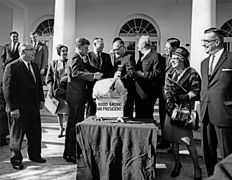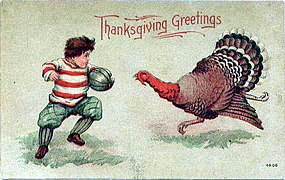The History of Thanksgiving: An Introduction
Alice Hopkinson explores the history of Thanksgiving and challenges us to rethink the accepted narrative.
Last year marked the 400th anniversary of the ‘First Thanksgiving’ of 1621, something that holds a deep, traditional meaning, and has become enshrined in the American cultural conscience. Since George Washington’s first Thanksgiving Proclamation of 1789, Presidents have used the holiday to convey ideals that lie outside the sphere of traditional religiosity and notions of simply ‘giving thanks’ for a bountiful harvest. Proceeding years saw successive Presidents devote their attention towards reaffirming the values of the Founding American Republic, discussing events of the previous year or addressing broader issues affecting the Nation. Whilst this is certainly indicative of a progressing American cultural identity, it is emblematic of Thanksgiving finding its own origin for tradition and subsequently evolving into something far greater and disparate from what it meant at its conception.
Thanksgiving has developed from a solemn and simple Colonial observance of thanks into an enterprising celebration that encompasses a variety of values, yet holds a far more sinister meaning for the Native American people supposedly crucial to its founding legend.
The ‘First Thanksgiving’ at Plymouth
Those who first settled in the Massachusetts Bay area were those who retreated from England following indignation and persecution for their religious practices. As a somewhat more extreme derivative group of Puritans, the Pilgrims sought to deviate from the practise of religion that had been reformed under King James I, and were therefore at severe risk of persecution if they were to remain in England. Fleeing to the New World in search of religious freedom, the Pilgrims landed at Plymouth Rock and on Native Wampanoag territory- something that is frequently omitted from contemporary retellings.
Famine and disease had been rampant throughout the voyage, with these poor conditions only becoming worse as the Pilgrims struggled to provide for themselves and build a self-sustaining settlement in this new environment. After a particularly tough winter the Pilgrims received invaluable guidance and assistance from the Wampanoag tribe, who graciously taught the settlers how to live off the land. It is at this instance that the ‘myth’ around the story of the first Thanksgiving becomes increasingly prevalent. The Pilgrims in return thanked the Wampanoag people and, with the first harvest produced, held a dinner to acknowledge their kindness, enshrining in tradition the act of holding a celebration of thanks for instances of recognising gratitude.

Is this the whole story?
In reality, the peace between the settlers and Native Americans was short lived. Relations between the two groups quickly deteriorated and tensions became more aggravated, particularly with the rapid expansion of European settlements and the vast influx of migration that occurred from the 1630s. As a result, Native Americans were forced out of land that had once been theirs and have since been subject to rampant cultural erasure. This highlights the stark contrast between the seemingly peaceful relationship between the Pilgrims and Native Americans seen in portrayals of the ‘First Thanksgiving’, and the more sinister reality.
The origin of tradition
Despite the 1621 Thanksgiving being famously recognised as the ‘first’, it is important to acknowledge that the tradition of giving thanks was a precedent that long predated the 1620 Mayflower voyage, and something that was essentially imported by the European settlers. Colonists observed thanksgivings regularly and even sustained this practice through the Revolutionary era, observing the celebrations for bountiful harvests, victory in battle or for acts of seemingly divine benevolence that had transpired.
Thanksgiving as a holiday
With George Washington’s 1789 Thanksgiving Proclamation offering gratitude for the recent ratification of the Constitution, formation of the American Republic and preservation of “safety and happiness… for the civil and religious liberty with which we are blessed”, it became possible to acknowledge the shift in meaning of Thanksgiving as a designated holiday held in the public conscience. Whilst Washington does acknowledge the religious sentiments of the occasion and gives thanks for fortune in harvest, he uses similar language to that found in the Declaration of Independence and Constitution, and spends the majority of his Proclamation affirming the founding values of the Republic- going to great lengths to ensure the people maintain the values enshrined in the nation’s founding documents.
Presidents since Washington have used Thanksgiving as a means to address the nation in a manner that is somewhat more informal than through official Proclamations or speeches. In each Proclamation, traditional religious values are consistently affirmed, as is the notion of giving thanks to God for the fortunes of the nation. However, each address is unique to the President and is in many ways a way in which to trace the narrative of American history in accordance with the fundamental issues concerning the nation. Last year President Biden marked the 400th anniversary of the ‘First Thanksgiving’ by acknowledging the “generosity and support of the Wampanoag” and compared their actions to those who have dedicated their time to fighting the COVID-19 pandemic. A very topical Proclamation, it is one that dedicates itself more to reaffirming familial and traditional values as opposed to those of the nation and Founding Fathers- fitting, considering the context in which it was written.
Contemporary meaning
Culturally, Thanksgiving has shed much of its religious sentiment in recent years and has become almost unrecognisable from its origin. Maintaining its association to harvests, it has become more familial, with it being tradition for many families to hold a Thanksgiving dinner that incorporates much of the food typically found on the North American continent, the turkey being the most pertinent example of such.
Furthermore, it has evolved to accommodate America as a consumerist nation that thrives on business and a booming economy, with contemporary traditions such as the Macy’s Day Parade, American football games and the amusing White House turkey pardon being the focus of attention throughout the country.


These new and emerging customs demonstrate how Thanksgiving as a cultural tradition has taken on a new meaning that has adapted and evolved in line with the changing American people. Yet aside from the jubilations brought on by the holiday, it is paramount to bear in mind that these traditions exist only for some. Many Native Americans choose not to celebrate Thanksgiving, serving as a reminder that a whole representative body has been practically omitted from the mainstream teaching of Thanksgiving. This highlights the importance of preserving these narratives.
To hear a continuation of this discussion, join us on November 25 2022, 5pm GMT/12pm BST.
Author: Alice Hopkinson


